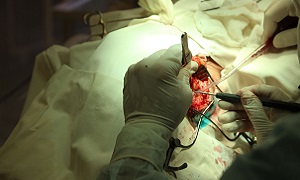Best Cochlear Implant Doctors in India
Here are the most reputed ENT surgeons in India with great expertise in Cochlear Implant procedure.
Best Cochlear Implant Hospitals in India
Lilavati Hospital & Research Centre, Mumbai
- City: Mumbai, India
Hospital Highlights:
- Lilavati Hospital & Research Centre is India’s premier multi-speciality tertiary care hospital and has been recognised as a global medical excellence centre.
- Lilavati Hospital & Research Centre has built an unrivalled level of trust with its patients over the years, thanks to a solid foundation that comprises cutting-edge facilities, the best medical competence, research, education, and charity endeavours.
- The hospital is quite proud of the fact that it now serves patients from all kinds of backgrounds, not just from the United States but from all around the world.
- The hospital has a total of 323 beds, one of the largest Intensive Care Units (ICUs), 12 Operation Theatres with modern amenities, over 300 consultants, and almost 1,800 personnel.
Venkateshwar Hospital, Dwarka, New Delhi
- City: New Delhi, India
Hospital Highlights:
- State-of-the-art technology and devoted healthcare professionals have been brought together under one roof at Venkateshwar Hospital to provide genuine medical care. The hospital’s professionals work together as a team to deliver the best possible treatment to their patients, using the most sophisticated equipment and information technology.
- Venkateshwar Hospital’s mission is to attain global excellence in healthcare by employing evidence-based, ethical clinical practices and cutting-edge technology by a team of highly skilled experts.
MGM Healthcare, Chennai
- City: Chennai, India
Hospital Highlights:
- Located in Chennai, India, MGM Healthcare is a top multispecialty hospital that provides all medical services under one roof.
- Since its founding in 2019, MGM Healthcare has quickly become a leading national referral centre, creating several innovative flagship initiatives.
- MGM Healthcare combines next-generation medical and digital technologies to provide better patient results.
- With 12 centres of excellence, more than 400 inpatient beds, 100 intensive care unit beds, and 24/7 emergency care, MGM Healthcare leaves no chance in redefining the patient experience in Chennai.
- MGM Healthcare boasts 250+ expert doctors across 30+ departments, including Cardiology, Pulmonology, Neurology, Obstetrics & Gynaecology, and more.
- They house 12 specialized Centres of Excellence, including Neurosciences, Orthopaedics, and Multi-Organ Transplantation.
- Their team of doctors, nurses, and paramedics works together to give every patient individualized treatment.
Apollo Hospitals, India
- City: India
Hospital Highlights:
- Apollo Hospitals is a private healthcare group in India, with its headquarters based in Chennai. Established in 1983 by Dr. Prathap C. Reddy, the group offers a wide range of medical treatments and services across various specialties.
- It is renowned for emphasizing innovation and utilizing cutting-edge medical technologies into patient treatment.
- Known as India’s first corporate hospital, Apollo Hospitals is often credited for pioneering the private healthcare revolution in the country.
- With clinics and hospitals located all throughout India, Apollo Hospitals is a nationwide healthcare organization. Its presence can also be found in foreign countries.
- Preventive health examinations, medical and surgical treatment, and diagnostic centres are just a few of the services that the Apollo group provides.
- The group has several centres of expertise, including Cardiac Sciences, Neurosciences, Orthopedics, Emergency Care, Cancer Care, and Organ Transplantation.
Apollo Health City, Hyderabad
- City: Hyderabad, India
Hospital Highlights:
- Located in the vibrant city of Hyderabad, Apollo Health City is a world-renowned medical facility that provides outstanding care and treatment to patients coming from different parts of the world.
- Founded in 1988, this 550-bed multispecialty hospital with 50 specialties and 12 Centres of Excellence continues to deliver outstanding outcomes for patients with the simplest to the most complicated medical conditions.
- Backed by the latest medical equipment and a dedicated team of professionals, the hospital provides comprehensive treatment across various specialties including, cardiology, critical care, neurosciences, cancer, orthopedics, gynecology, ENT, transplants, gastroenterology, etc.
- Apollo Health City is a cutting-edge healthcare facility that combines various facilities under one roof. These may include state-of-the-art physical medicine, rehabilitation, and wellness services with education, research, telemedicine, innovative medical devices, disease management programmes, and medical talents.
- The hospital is known for offering top-notch cancer treatment accompanied by cutting-edge facilities and technology.
- The hospital also offers a broad spectrum of cosmetic procedures that improve not just appearance but also comfort.
- In 2011, Apollo Health City was the recipient of the Asian Hospital Management Award (AHMA).
- In 2013, the Government of India recognized Apollo Health City as the top medical tourism destination in the country.
Apollo Gleneagles Hospitals, Kolkata
- City: Kolkata, India
Hospital Highlights:
- Established in 2003, Apollo Gleneagles Hospitals is a 750-bed multispecialty tertiary care hospital situated in Kolkata.
- With 33 Centres of Excellence and more than 50 specialties, Apollo Gleneagles Hospitals, Kolkata is capable of handling all sorts of patients.
- This tertiary care hospital, which is a 100% subsidiary of Apollo Hospitals Enterprise Ltd., India, is regarded as one of Kolkata’s top hospitals.
- The facility is a complete blend of cutting-edge technology, state-of-the-art infrastructure, and genuine hospitality.
- Focusing on numerous specialties, the hospital provides all-inclusive medical treatments supported by cutting-edge technology and a staff of highly qualified medical specialists.
- Patients across the globe come to Apollo Gleneagles Hospitals Kolkata for their treatment. Moreover, international patients receive full attention and assistance for their treatment and are provided with a hassle free experience.
- Apollo Gleneagles Hospitals, Kolkata is the only hospital in Eastern India to hold the Joint Commission International (JCI) certificate.
- It is also the only hospital in Kolkata to hold the NABL accreditation in six different categories, which includes Clinical Biochemistry, Clinical Pathology, Hematology & Immunohematology, Microbiology & Serology, and Histopathology & Cytopathology.
- Furthermore, Apollo Gleneagles Hospitals, Kolkata is known for performing the first ever Reverse Shoulder Prosthesis Replacement in East India.
Apollo Hospitals International Limited, Ahmedabad
- City: India
Hospital Highlights:
- As a member of the Apollo Hospitals Group, Apollo Hospitals International Limited, Ahmedabad is one of the most popular and sought-after medical facilities in Gujarat.
- Through its 6 Centres of Excellence and various affiliated branches, which cover all specialties and subspecialties, the hospital provides the most advanced clinical services.
- Since its inception in 2003, the hospital has been providing each patient with the most up-to-date medical equipment and state-of-the-art technology.
- With more than 150 successful organ transplants, including liver and renal transplants, the facility has been able to build a strong and extensive organ transplant program.
- In addition to performing 600 surgeries and caring for over 1800 patients on an IP basis, the hospital sees more than 18,000 patients on average in the outpatient department.
- With one of the biggest cardiology teams in the area, the hospital provides state-of-the-art regional care treatment in Cardiac Sciences.
- Additionally, the hospital offers a broad range of Neuro Interventional techniques to help stroke patients recover more quickly.
Apollo Hospitals, Navi Mumbai
- City: Mumbai, India
Hospital Highlights:
- Established in 2016, Apollo Hospitals, Navi Mumbai is one of Maharashtra’s most advanced multispecialty hospital. This 500-bed hospital provides sophisticated treatments and integrated super specialty services under one roof.
- The hospital features a cutting-edge infrastructure that houses 13 state-of-the-art operating rooms, advanced laboratory and medical diagnostics, and 120 ultra-modern I.C.U. beds, including N.I.C.U. and P.I.C.U., monitored round the clock by critical care specialists.
- With 57 specialties and subspecialties, the hospital boasts a team of renowned medical specialists who offer accurate diagnosis and treatment with easy accessibility to their patients.
- Additionally, the hospital offers highly customized, individualized health check programs that are made to fit each person’s needs in terms of lifestyle.
- Apollo Hospitals, Navi Mumbai has been accredited by both the National Accreditation Board for Hospitals and Healthcare Providers (NABH) and the Joint Commission International (JCI).
- Apollo Hospitals Navi Mumbai has been awarded the “Best Practices-International Services Award” at the annual awards for service excellence and operations excellence.
Apollo BGS Hospitals, Mysore
- City: India
Hospital Highlights:
- Situated in the centre of Mysore, Apollo BGS Hospitals, Mysore is a super-speciality tertiary care hospital, established in 2001.
- Today, it is considered to be one of the biggest private hospitals in Mysore and is also approved by National Accreditation Board for Hospitals (NABH).
- The hospital treats more than two million patients a year and is well-equipped with the latest medical technology.
- Its core specialties include Cardiology, Orthopedics, Neurosciences, Transplant Institutes, Cancer, Gastroenterology, and Emergency Care 24/7.
- It has highly qualified doctors and committed staff who are dedicated in providing the best medical care for the entire spectrum of facilities at the hospital.
- Additionally, Apollo BGS Hospitals, Mysore prioritizes excellence in clinical services, diagnostic amenities, and research endeavors so much so that it aims to enhance India’s worldwide reputation as a healthcare hub.
- Since it is the only hospital in Mysore to operate with a full-time specialized system, it ensures the availability and accessibility of only the best medical expertise around the clock.
- Some popular specializations for medical consultations, treatments, and operations at Apollo BGS Hospitals, Mysore include Bariatric Surgery or Weight reduction surgery, Multiorgan Transplants, Holmium laser therapy for Prostate & Kidney stones treatment, and Laparoscopic treatment for Hernias, Fissures, and Breast lumps.
Cochlear Implant
Cochlear Implant is a device implanted in the cochlea through a surgical procedure.
The cochlea is a snail shell-shaped bone present in your inner ear.
Any person having severe hearing loss may find Cochlear Implant beneficial. The function of the device is to convert sounds in the form of electrical impulses that the brain interprets. To simply put, it replaces the function of the cochlea.
What is a Cochlear Implant?
It is an electronic medical device that helps in improving hearing in people with moderate to severe hearing loss.
The device electrically stimulates the cochlear nerve and comprises of external and internal components.
Placed behind the ear, the external component contains a microphone and a speech processor. While the microphone receives sound waves, the speech processor turns the sound into digital signals by analyzing it. The transmitter receives the signals followed by an internal receiver.
Implanted beneath the skin, the internal component is also present behind the ear. The receiver turns the signals into electrical impulses. The electrodes in the cochlea receive the impulses that stimulate the cochlear nerve. The cochlear nerve forwards these impulses to the brain to induce a sense of hearing.
Features of Cochlear Implant
A Cochlear Implant restores hearing in people who have severe hearing loss and who cannot hear with the help of hearing aids. It may be unilateral or bilateral, i.e. paced in one or both the ears.
It improves the quality of life by improving the communication of the people with hearing loss.
A Cochlear Implant is for all adults and children (who are at least 6 months old).
People using Cochlear Implants experience:
- Recognition of normal sounds
- The ability to identify the origin of sound
- Better abilities to hear speech
- Can hear television programs, conversations, and music
- Ability to listen even at noisy places
Why do I need a Cochlear Implant?
You may need a Cochlear Implant if you have:
- Limited benefits from other hearing aids
- Severe hearing loss that hinders your communication
- To depend on lip-reading even with hearing aids
- No medical conditions that can increase the risks due to Cochlear Implants
- Expectations from cochlear implants
- Wish to be a part of the hearing rehabilitation
Advantages of a Cochlear Implant
A Cochlear Implant can be beneficial for you. Here are some of the benefits of using a Cochlear Implant:
- Be able to hear distinct sounds
- Hear voices on a phone call
- Watch television programs without difficulty
- Able to hear speech without the need for lip-reading
- Hear music without any difficulty
- Toddlers can learn how to talk
How to prepare for Cochlear Implant surgery?
The doctor will perform the surgery under general anesthesia. This means you will be sleeping during the procedure. You may need to stop or alter some of the medications that you take for a particular time period. You may have to avoid eating or drinking hours before the surgery or night before the surgery.
Cochlear Implant Procedure
Before the procedure
The doctor will evaluate your medical condition to check if Cochlear Implants are a good option for you or not. He or she will conduct an evaluation like:
- Recommend tests for speech and hearing
- Recommend imaging tests like an MRI or CT scan to inspect the condition of your inner ear structure
- Physical examination for assessing the health of your inner ear
- Psychological testing to determine your ability to learn and use Cochlear Implants.
During the procedure
The doctor will make a small incision (or cut) behind your ear and create a hole in a part of the skull bone where the device will rest. He or she will next, create an opening in the cochlea and thread the electrode of the internal device. The internal device remains under your skin and the surgeon will stitch the incision.
After the procedure
You may experience little discomfort over the ears with the implanted device. You may also feel nausea or dizziness. The doctor will discharge you on the day of the surgery or the next day.
The audiologist will activate the implant only after 4-5 weeks of surgery to allow healing of the surgery site. Upon activation, the audiologist will adjust the sound processor and check if the components are working. He or she will instruct you on the usage & care of the device and then set the device so that you can hear.
You may need to undergo rehabilitation to train your brain to understand the sounds that you hear through the implant. Your brain will need time to recognize the various sounds and what they mean. You will achieve the best results when you wear the speech processor continuously while you are awake.
Results
The results of the surgery may vary for each individual. The age when you lost hearing and the length of time between your hearing loss & surgery is amongst the factors that affect the outcome of the surgery. Children suffering from hearing loss will best benefit when they undergo Cochlear Implant surgery at a young age. For adults, it is better to take the surgery within a short period of time from hearing loss.
People who are fit for the surgery will be able to clearly hear the voice with the device. Cochlear Implant may improve the severity with which tinnitus is present. There are very fewer chances that tinnitus will worsen with the surgery.
Risks
Although it is safe to undergo cochlear implantation surgery, you may have some risks. These risks may be:
- Implanting the device may cause some loss of natural hearing in a few individuals.
- You may need to visit the surgeon again for the repair or replacement of a faulty internal device.
- The adults and children undergoing surgery need to take vaccination to minimize the risk of meningitis.
Some rare complications associated with the cochlear implantation surgery may include: - Infection at the site of surgery
- Balance problems
- Disturbance with the taste
- Bleeding
- Infection due to device
- Dizziness
- Facial paralysis











